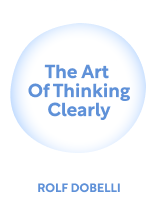

This article is an excerpt from the Shortform book guide to "The Art of Thinking Clearly" by Rolf Dobelli. Shortform has the world's best summaries and analyses of books you should be reading.
Like this article? Sign up for a free trial here .
What is hyperbolic discounting bias? Why is the brain so prone to seeking immediate gratification?
Hyperbolic discounting bias is the tendency to crave immediate gratification and the willingness to sacrifice an unreasonable amount of money, time, or effort for that immediacy. According to Rolf Dobelli, the author of The Art of Thinking Clearly, humans are hardwired to opt for immediate reward (in the past, it helped us survive), but more often than not, it inspires bad decisions, like paying a high amount to get something quicker.
Keep reading to learn about hyperbolic discounting bias, why it happens, and how to counteract it.
Hyperbolic Discounting
Hyperbolic discounting bias is the tendency to opt for instant gratification and the willingness to make unreasonable sacrifices to attain it. It’s difficult for people to wait for things, Dobelli says, a tendency that accelerates the closer you come to attaining gratification.
(Shortform note: While Dobelli doesn’t define it as such, this is an example of overused hot cognition and underused cold cognition. People who can delay gratification have better-developed prefrontal cortexes, the part of the brain that handles cold cognition. Thus, they delay gratification by using their prefrontal cortexes to engage cold cognition. Meanwhile, those with less developed prefrontal cortexes are more susceptible to the instinctual desire for instant gratification.)
Dobelli says this is an instinctive trait from times when humans were more animalistic, noting that animals display this trait too. Consider wolves, who eat almost half their body weight at once. They can’t delay gratification because they don’t know when they’ll have another meal. However, humans no longer need instant gratification to survive, so hyperbolic discounting just leads to bad decisions, like paying an unreasonably high amount to get something quicker.
How to Avoid Hyperbolic Discounting
How can you avoid hyperbolic discounting (and, therefore, bad decisions)? Dobelli doesn’t say, but one solution is priming. Priming means exposing yourself to certain stimuli that encourage your brain to respond to later, different stimuli in a desired way. In the case of hyperbolic discounting, you’d expose yourself to stimuli that encourage you to delay gratification the next time you encounter a choice between delaying and immediacy.
There are two ways to prime yourself to delay gratification:
1. Talk about your future plans. Using the words “future” and “self-control” can prime you to delay gratification later on. Combining these words with a broader discussion of your plans reinforces your goals and makes you more likely to carry them out.
2. Imagine talking to your future self. This exercise lets you see a possible result of your decisions. Focus on avoiding instant gratification in the long-term by imagining a positive future for yourself if you make good long-term decisions. Imagining a negative future that comes from instant gratification also works.

———End of Preview———
Like what you just read? Read the rest of the world's best book summary and analysis of Rolf Dobelli's "The Art of Thinking Clearly" at Shortform .
Here's what you'll find in our full The Art of Thinking Clearly summary :
- A detailed look at the most common logical fallacies that inhibit decision-making
- How to recognize and overcome these fallacies to make better decisions
- Why you value things for arbitrary reasons






